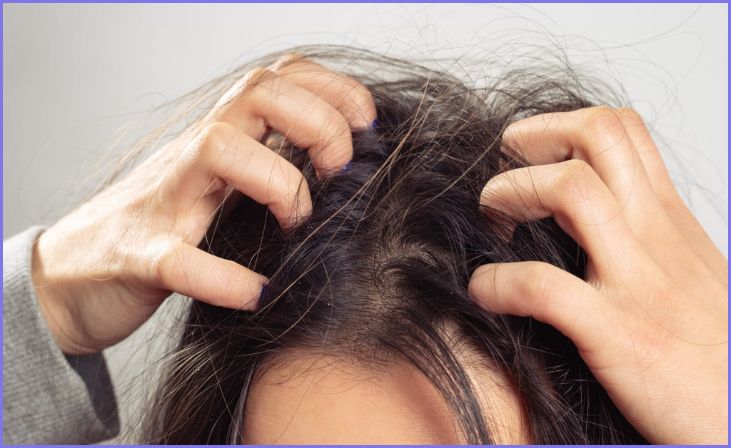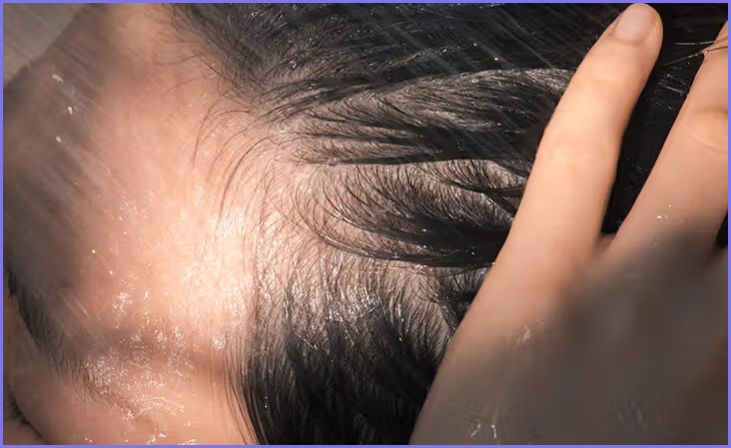Can Bed Bugs Live In Your Hair – Have you ever been worried that your hair may have been infested with bed bugs? If so, then read this article to find out more about how they can live in your hair. This article will answer an important question for anyone who has ever had long hair – can bed bugs live in your hair? And, more importantly, how do you know if you have them?
First and foremost, it’s crucial to understand that bed bugs do not like to congregate on the skin or in the hair of humans. It is possible that they will conceal on a person when moving from one location to another (for example, from a public area to your home), but when they are not eating, they prefer to nest somewhere out of sight. The likelihood that you’re dealing with fleas, ticks, or lice rather than bed bugs is high if you see bugs crawling on you regularly during the day (especially if you’re away from your house).
It is quite unusual that you will find bed bugs in your hair. Bed bugs, in contrast to lice and ticks, do not have claws that are designed to assist them in navigating through hair. Their front claws must be placed in a specific manner before they can begin eating, which is difficult enough to accomplish without hair getting in the way of the process. When bed bugs arrive to feed, they prefer to do so on bare flesh rather than on clothing.
What Are Bed Bugs?

Bed bugs are small, bloodsucking insects that live in warm environments. They typically hide in mattresses, bed frames, and cracks in the wall. Bed bugs make their way to new infested sites by hitching rides on people’s clothing. They then spread to other locations like suitcases or purses – places that they cannot yet invade.
Where Can You Find Them?
Bed bugs can be found in a number of places, but some of the most common locations are on your bed, in your sheets, and inside your furniture. They’re also often found in public places like hotels, schools, offices, and hospitals. In these cases, it’s not an issue with the building. Bed bugs hitch a ride from person-to-person or from one room to another.
What Do They Eat?
Bed bugs are one of the most common species of insects that infest homes. They need blood to survive, but they’re not interested in just any blood. They prefer human blood because it’s high in sugar. Bedbugs will tend to hide during the day and come out at night when it’s dark and people are sleeping. What do bedbugs eat? They will drink your blood if they can, but their diet primarily consists of skin cells, perspiration, and other bodily fluids found near or on a warm-blooded host.
Do They Bite Humans?
Bed bugs feed primarily on the blood of humans and other warm-blooded hosts. The saliva of bed bugs can leave irritating bites on its victim’s skin. These pests primarily feed at night, often coming out to look for a host when it is dark and quiet. However, they can also be seen during the day and even in daylight hours, usually after a person has been sleeping or sitting under the sheets.
early signs of bed bugs

Bed bugs are small and wingless insects that live on the blood of animals or humans. They lay eggs, which hatch and become nymphs, which grow into adults. Bed bugs hide during the day and come out at night to feed. The main way they spread is through our belongings or on the clothes we wear.
Quick Link: Hair Texturizer
How to Treat a Bed Bug Infestation
When it comes to treatment, you can’t get rid of bed bugs just by throwing your sheets into the washing machine. Bed bug eggs are highly resistant to heat, so even the highest setting won’t kill them. You’ll need to spray them with a special pesticides that will kill bugs on contact, while also leaving behind a pesticide residue that will prevent new eggs from hatching for up to six weeks. You’ll also have to discard any furniture or clothing that might have come in contact with bed bugs so they don’t harbor any eggs.
What is the process through which bed bugs get into your hair?
They are little insects that live in burrows during the day and emerge at night to suck on the blood of human beings. Their victims do not awaken because they are attacked while they are sleeping, with an anaesthetic injected into their skin to prevent them from awakening. They most frequently bite the arms, legs, and face, but they have been known to bite beyond the hairline and into the scalp as well.
Bed bugs are not attracted to your hair of their own own. They consider your scalp to be nothing more than another supply of blood. If you get out of bed before they have finished feeding or before they have returned to their daily hiding locations, you will be dragging the little insects with you out of bed with you. From there, the bugs may take a ride to other sections of your house, into your automobile, or even to other structures.
Capabilities of Bed Bugs
Contrary to popular opinion, bed bugs do not usually reside in people’s hair, as is commonly believed. These creatures prefer to reside in dark, isolated areas. This could be hidden behind your bed, between pieces of furniture, against walls, or among crevices in your floorboards and baseboards. In the evenings, while hosts are dormant, bed bugs will usually emerge from their hiding places to feed on their hosts’ blood.
They don’t want to be seen lingering since they prefer that the host does not move. Instead, they instantly crawl back to their hiding place to digest what they’ve just consumed. So, even if bed bugs don’t dwell in your hair, can they sneak into your hair somehow? In a technical sense, absolutely.
In order to get to your skin as they are leaving their harbours to locate food, they may travel across your hair. While it is possible that they will crawl into your hair, it is doubtful that they will do so. If anything, they may momentarily cross on top of it for a little period of time.
What’s the Best Way to Prevent a Bed Bug Infestation?
One of the best ways to prevent bed bug infestations is to make your bedding off limits to these pests. If you live in an area with known bed bugs, it is important to wash sheets and blankets weekly since this will help get rid of any eggs or bugs that might be present. You should also vacuum your mattress and other furniture on a regular basis.
Can Bed Bugs Live In Your Hair?

It is a common misconception that bedbugs can only live in mattresses and couches. These pests can actually infest other areas in your home, including your hair! The eggs of a female bedbug are too small to be seen with the naked eye, but they will eventually hatch and the nymphs will be able to start feeding.
Read Also: Is mane and tail good for your hair
can bed bugs get in your hair and lay eggs
Bed bugs are notoriously known for making themselves at home in mattresses, carpets, and couches. But of course, they can also find their way into your hair! Bed bugs are attracted to the sweet smells of blood on the scalp and on the hair shafts. They tend to nest around the root of your hair because it offers a perfect environment for them to live comfortably.
can bed bugs live in your clothes
The answer is yes. Bed bugs can live in your clothes and they can also infest your hair with a special technique that enables them to sit on top of a scalp without a head. This is because bed bugs have the ability to drink blood from a meal with their legs by going back and forth with their abdomen. The bed bugs will climb up your neck, hang out at the base of your skull, and wait for you to brush your head so it can jump onto the food source.
can bed bugs live in your pillow
Bed bugs are parasites that feed on the blood of their host. They can live in bedding, furniture, and carpets. The most common places to find bed bugs are in mattresses, baseboards, or upholstered furniture that is near beds.
can bed bugs go in your ear
Bed bugs are small parasites that can move very quickly. You may be wondering whether or not bed bugs can crawl inside your ear. Although the thought is horrific, it’s possible for them to do so because they’re so small and sneaky. The best way to protect yourself against these pests is to wear an insect repellent every day.
can bed bugs live on your body

Bed bugs can live on your body, but they prefer to nest in areas where there are plenty of human blood meals. They are attracted by the heat of the human body and the carbon dioxide that is exhaled.
Conclusion
Bed bugs can be found in your bed, in your couch, in your drawers, and in the folds of curtains. It’s not uncommon to find them living in your hair too. This means that if you’re not careful about how you maintain your hair, you might end up with bed bugs hitchhiking on it. One way to prevent this is to wash all of the clothes and linens in hot water, vacuum thoroughly, and make sure to seal the house up tight.
Light bulbs are attracted to heat so when they get close enough they will start flashing; this is their warning signal
FAQs
Bed bugs typically lay eggs in hiding spots close to their host, such as in the seams of mattresses or other furniture. They are not known to lay eggs in hair.
Bed bugs are skilled at crawling, and they can move through hair to reach the skin. However, this is not their preferred hiding place, and they will likely move on to areas with easier access to blood.
Bed bugs are not adapted to live on the human body for extended periods. They prefer to hide in the environment close to their host. While they may crawl through hair to feed, they will eventually return to their hiding places.







